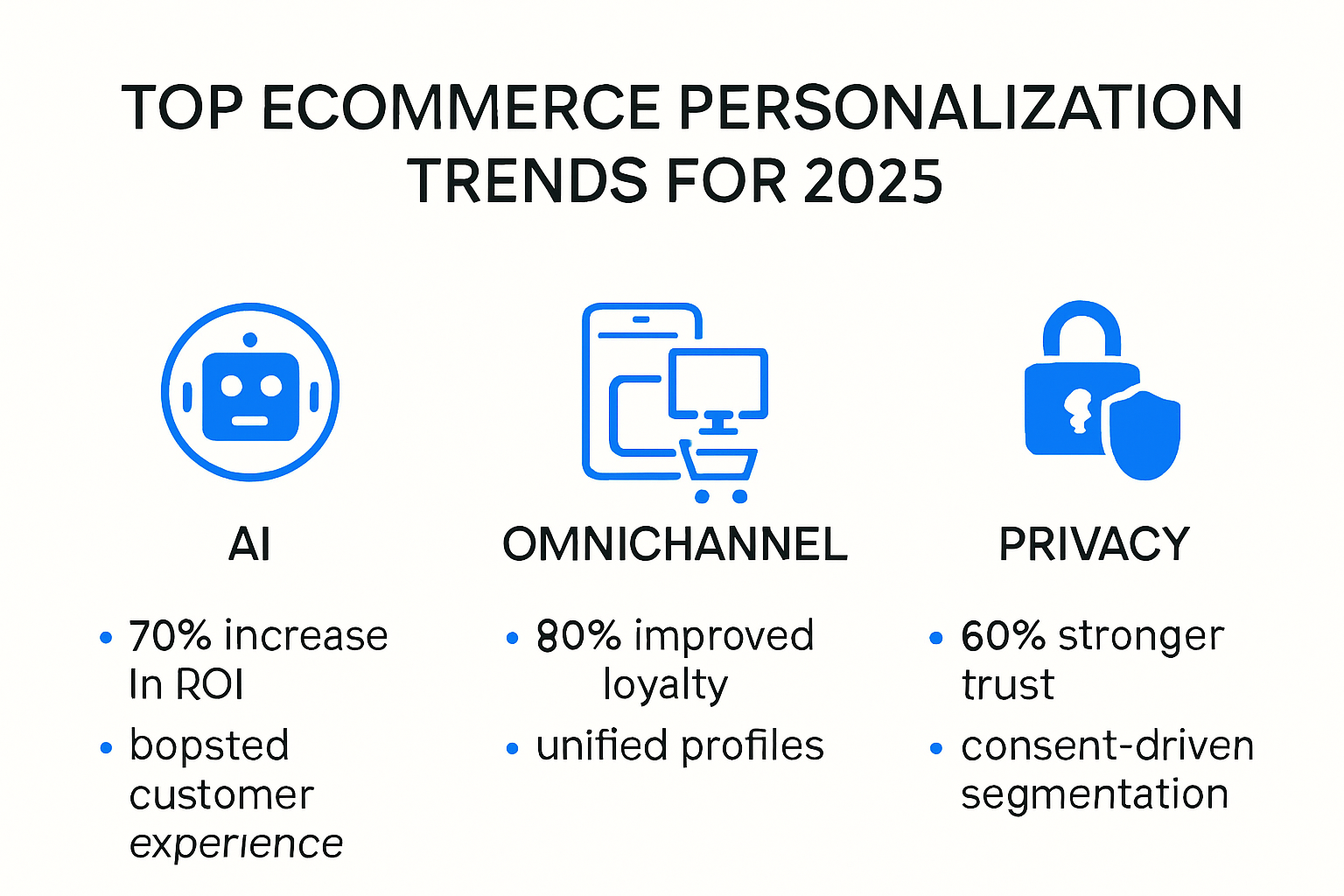Top Ecommerce Personalization Trends for 2025: What Businesses Need to Know
Ecommerce is changing fast and businesses are racing to keep up with what shoppers really want. Personalization can deliver five to eight times the marketing ROI and lift sales by 10% or more. You might think that just collecting more data is the answer and yet the real edge now comes from pairing smart tech with respect for your customers’ privacy. This shift is reshaping how online stores build trust and loyalty in 2025.
Table of Contents
- AI And Data-Driven Personalization In Commerce
- Omnichannel Experiences For Modern Shoppers
- Privacy, Trust, And Personalization Balance
- Actionable Personalization Strategies For Businesses
Quick Summary
| Takeaway | Explanation |
|---|---|
| AI-Driven Personalization is Essential | Implementing machine learning and predictive analytics allows businesses to create hyper-personalized experiences that significantly increase engagement and sales. |
| Omnichannel Strategy is Crucial | Customers expect fluid interactions across digital and physical platforms, necessitating unified data integration for personalized experiences. |
| Prioritize Privacy and Transparency | Maintaining customer trust through clear communication about data usage and ethical practices is vital for effective personalization strategies. |
| Build Comprehensive Customer Profiles | Developing dynamic customer profiles that integrate various data sources enables businesses to anticipate customer needs effectively. |
| Leverage Advanced Segmentation | Creating micro-segments based on behavioral patterns and preferences allows for more targeted marketing experiences, enhancing customer satisfaction and sales. |

AI and Data-Driven Personalization in Commerce
The transformation of ecommerce personalization through artificial intelligence represents a quantum leap in how businesses understand and engage with customers. AI technologies are revolutionizing the way companies collect, analyze, and leverage customer data to create hyper-personalized shopping experiences.
Machine Learning: The Intelligence Behind Personalization
Machine learning algorithms have become the backbone of advanced ecommerce personalization strategies. These sophisticated systems can process massive amounts of customer data in real time, identifying intricate patterns and preferences that human analysts might miss. According to McKinsey , personalization can deliver five to eight times the return on investment on marketing spend and lift sales by 10% or more.
The power of machine learning lies in its ability to continuously learn and adapt. By analyzing browsing history, purchase patterns, demographic information, and even social media interactions, AI can create incredibly nuanced customer profiles. These profiles enable businesses to predict customer needs with remarkable accuracy, offering product recommendations that feel intuitive rather than algorithmic.

Predictive Analytics and Real Time Personalization
Predictive analytics takes personalization to an unprecedented level of sophistication. Research from Gartner suggests that companies leveraging advanced predictive models can increase their profitability by reducing customer acquisition costs and improving conversion rates. These models can anticipate customer behavior before the customer themselves might recognize their own needs.
For instance, an AI system might recognize that a customer who recently purchased running shoes is likely interested in complementary fitness gear. The system can then dynamically adjust website content, email recommendations, and even ad targeting to present precisely the right products at the right moment. This level of personalization creates a shopping experience that feels uniquely tailored to each individual customer.
The integration of AI in ecommerce personalization is not just about selling more products. It represents a fundamental shift in how businesses understand and interact with their customers. By treating each interaction as a unique data point, companies can build more meaningful, responsive relationships that extend far beyond traditional transactional models.
As technology continues to evolve, the boundaries between personalization and predictive customer experience will become increasingly blurred. Businesses that invest in robust AI and machine learning capabilities will be best positioned to meet the growing customer expectation for individualized, intelligent shopping experiences.
Omnichannel Experiences for Modern Shoppers
The modern shopping experience has transcended traditional boundaries, requiring businesses to create seamless interactions across multiple platforms and touchpoints. Omnichannel personalization represents a sophisticated approach to meeting customers wherever they are, providing consistent and tailored experiences that adapt to individual preferences and behaviors.
Breaking Down Channel Barriers
Consumers now expect fluid interactions between digital and physical shopping environments. According to Harvard Business Review , 73% of shoppers use multiple channels during their shopping journey. This means customers might start researching a product on mobile, compare prices on desktop, and ultimately complete their purchase in a physical store or through a mobile app.
Successful omnichannel strategies require sophisticated integration of data across platforms. This involves creating a unified customer profile that tracks interactions seamlessly. For example, a customer who adds an item to their online cart should see that same item reflected in their mobile app and potentially receive personalized recommendations based on that interaction when they visit a physical store.
To clarify how omnichannel personalization combines channels and data, here’s a summary table comparing digital and physical touchpoints and how data integration benefits each channel:
| Channel Type | Example Touchpoints | Personalization Benefit |
|---|---|---|
| Digital | Website, Mobile App, Email, Online Ads | Unified recommendations, real-time updates |
| Physical | In-Store, Kiosks, Events | Personalized in-store offers, integrated carts |
| Mixed | Click & Collect, Mobile In-Store, QR Codes | Seamless transition, cross-channel consistency |
Personalization Across Multiple Touchpoints
Research from Salesforce reveals that 52% of customers expect offers always to be personalized. This expectation extends across every interaction point - whether it 7t’s a mobile app, website, email communication, or in-store experience. Successful omnichannel personalization means creating a consistent narrative that feels uniquely tailored to each individual customer.
Technology plays a crucial role in enabling these sophisticated interactions. Advanced customer data platforms can integrate information from multiple sources, creating a holistic view of customer behavior. This might include tracking purchase history, browsing patterns, social media interactions, and even in-store movement through location-based technologies.
The most effective omnichannel experiences go beyond mere data collection. They anticipate customer needs and provide proactive solutions. For instance, a customer who frequently purchases fitness equipment online might receive personalized workout recommendations in-store, or a mobile app notification about a complementary product that matches their previous purchases.
As digital and physical shopping experiences continue to converge, businesses must invest in technologies and strategies that create truly integrated, personalized journeys. The future of ecommerce personalization lies not in individual channel optimization, but in creating a cohesive, adaptive experience that feels natural and intuitive to the customer.
Companies that successfully implement robust omnichannel strategies will differentiate themselves in an increasingly competitive marketplace. By treating each customer interaction as part of a continuous, personalized journey, businesses can build deeper connections and drive long-term customer loyalty.
Privacy, Trust, and Personalization Balance
As ecommerce personalization becomes increasingly sophisticated, businesses face a critical challenge: maintaining customer trust while delivering personalized experiences. The delicate balance between data-driven insights and consumer privacy has emerged as a fundamental consideration for modern digital strategies.
Transparency and Consent in Data Usage
According to Cisco's Consumer Privacy Survey , 86% of consumers care about data privacy and want more control over how their personal information is used. This heightened awareness demands that businesses adopt a transparent approach to data collection and personalization.
Effective privacy strategies go beyond legal compliance. They require businesses to develop clear, understandable communication about data usage. This means providing customers with granular control over their data, including easy-to-use privacy settings, clear opt-out mechanisms, and straightforward explanations of how their information will be utilized to enhance their shopping experience.
The following table summarizes key privacy-focused personalization strategies mentioned and their associated benefits:
| Strategy | Description | Customer Benefit |
|---|---|---|
| Transparency | Clear data usage communication | Builds trust, increases comfort |
| Consent & Control | User-friendly privacy controls and settings | Empowers users, gives autonomy |
| Ethical Data Use | Using data only for the customer’s benefit | Feels helpful, not invasive |
| Data Protection & Anonymization | Strong security protocols, anonymized data | Reduces risk, enhances security |
Ethical Data Personalization Strategies
Research from Forrester highlights that companies demonstrating ethical data practices can actually strengthen customer relationships. The key is to create value through personalization that feels helpful rather than invasive. This involves using data in ways that directly benefit the customer, such as providing more relevant product recommendations or streamlining the shopping experience.
Companies must implement robust data protection measures that go beyond minimum regulatory requirements. This includes anonymizing personal data, implementing secure data storage protocols, and giving customers meaningful choices about their data. For example, providing options to view, modify, or delete personal information builds trust and demonstrates a commitment to customer privacy.
The most successful personalization strategies will be those that view privacy not as a constraint, but as an opportunity to build deeper customer relationships. This means collecting only necessary data, being transparent about data usage, and consistently delivering value through personalized experiences.
Advanced technologies like differential privacy and federated learning are emerging as powerful tools for businesses seeking to balance personalization with privacy. These approaches allow companies to derive valuable insights without compromising individual user data, representing a sophisticated approach to ethical data usage.
As regulations like GDPR and CCPA continue to evolve, businesses must remain agile. The future of ecommerce personalization will be defined by those who can create truly personalized experiences while respecting customer privacy. This requires a holistic approach that combines advanced technology, ethical data practices, and a genuine commitment to customer trust.
Ultimately, the most successful ecommerce personalization strategies will be those that make customers feel empowered, not exploited. By prioritizing transparency, consent, and value creation, businesses can build personalization approaches that customers welcome rather than fear.
Actionable Personalization Strategies for Businesses
Implementing effective ecommerce personalization requires a strategic approach that goes beyond simple data collection. Businesses must develop comprehensive strategies that transform customer data into meaningful, targeted experiences that drive engagement and conversion.
Building Comprehensive Customer Profiles
According to Deloitte , businesses that successfully implement personalization can see a 10-15% increase in revenue. The foundation of this success lies in creating nuanced, dynamic customer profiles that capture more than basic demographic information.
Advanced customer profiling involves integrating multiple data sources to create a holistic view of customer behavior. This includes analyzing purchase history, browsing patterns, social media interactions, customer service interactions, and even predictive behavioral data. The goal is to create a 360-degree view that allows businesses to anticipate customer needs before they even arise.
Segmentation and Targeted Experiences
Research from Epsilon indicates that 80% of consumers are more likely to make a purchase when brands offer personalized experiences. Effective segmentation goes beyond basic demographic categorization, utilizing advanced clustering techniques that consider behavioral patterns, purchase intent, and individual preferences.
Successful personalization strategies involve creating multiple micro-segments that allow for extremely targeted experiences. This might include developing unique content, product recommendations, and marketing messages for specific customer groups. For instance, a sports equipment retailer might create distinct experiences for professional athletes, fitness enthusiasts, and casual weekend warriors.
Implementing personalization requires a multi-layered approach. Businesses should focus on creating adaptive experiences that can dynamically adjust in real-time. This means developing technologies that can instantly recognize customer context and modify content, recommendations, and user interfaces accordingly.
Technology plays a crucial role in executing these strategies. Machine learning algorithms can continuously refine customer segments, identifying subtle patterns that human analysts might miss. Advanced recommendation engines can go beyond simple product suggestions, creating entire personalized shopping journeys that feel intuitive and natural.
The most effective personalization strategies are those that provide genuine value to customers. This means moving beyond generic recommendations to create experiences that feel truly individualized. For example, a beauty retailer might offer personalized skincare routines based on individual skin analysis, or a clothing brand might provide style recommendations that consider a customer's unique body type and fashion preferences.
Businesses must also invest in the right technological infrastructure. This includes customer data platforms, advanced analytics tools, and flexible content management systems that can support dynamic, personalized experiences across multiple channels. Integration is key - personalization strategies must work seamlessly across mobile apps, websites, email, and physical stores.
Ultimately, successful personalization is about creating a sense of individual attention at scale. By leveraging advanced technologies and sophisticated data strategies, businesses can transform generic shopping experiences into personalized journeys that feel uniquely tailored to each customer.
Frequently Asked Questions
What are the key ecommerce personalization trends for 2025?
The key trends include AI-driven personalization, omnichannel experiences, a focus on privacy and trust, and the development of comprehensive customer profiles for targeted marketing.
How can AI improve ecommerce personalization?
AI enhances ecommerce personalization by leveraging machine learning to analyze customer data, allowing businesses to create hyper-personalized shopping experiences that increase engagement and sales.
Why is omnichannel personalization important for businesses?
Omnichannel personalization is crucial because customers expect seamless experiences across digital and physical platforms. It helps businesses provide tailored interactions that enhance customer satisfaction and loyalty.
How can businesses ensure customer privacy while personalizing experiences?
Businesses can maintain customer privacy by being transparent about data usage, offering control over personal information, and employing ethical data practices that prioritize the customer’s well-being.
Ready to Deliver Advanced Personalization for Your Ecommerce Business?
Struggling to keep up with customer expectations for AI-driven personalization and seamless omnichannel experiences? Many brands face challenges building unified customer profiles, leveraging machine learning, and delivering privacy-first personalization that actually converts. If you are determined to turn modern ecommerce trends into real business results, you need a partner who understands both technology and customer experience.

TRAVLRD brings you high-end, tailor-made digital solutions that transform your customer data into personalized online journeys. Our team specializes in innovative web and mobile development, as well as flexible SaaS products that support predictive analytics and integrate effortlessly across every channel. See our proven results and learn how we can future-proof your ecommerce growth. Explore our expertise at https://travlrd.com/ or request a free consultation to start building your next-generation personalized platform today.







